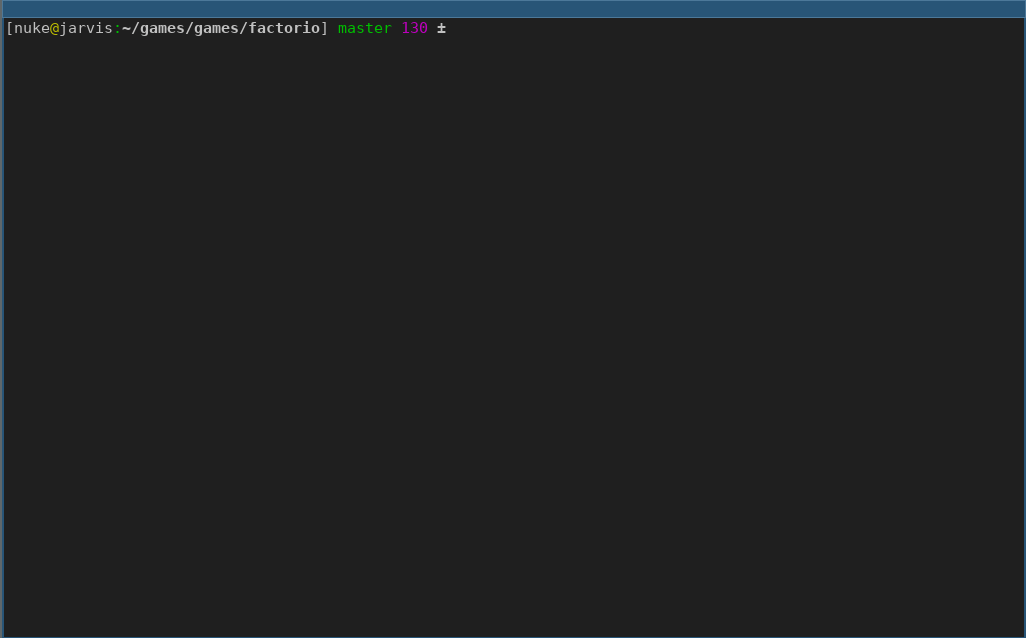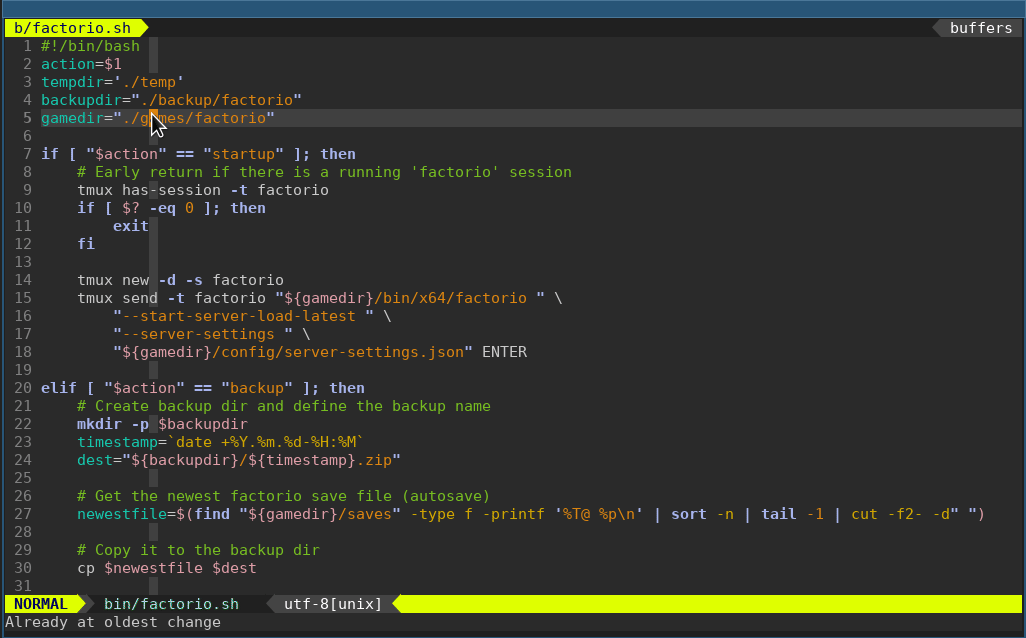This page aims to introduce you to some best-practices, when dealing with game servers.
In the following I'll cover several tools and examples that might help you to maintain your game servers.
Terminal multiplexer§
Most game servers offer an interactive shell, so admins can change stuff on the fly via commandline. That's why using a service manager such as systemd, is often not the best choice for managing game servers.
However, terminal multiplexer, such as tmux or screen, are super helpful and seem to be the right tool for the job.
They allow you to run commands on your headless server in detached shell. This means, that you can start the server and exit your current shell session without closing the server. You can then SSH back onto your server and enter the same session you left whenever you like.
Anyway, Tmux sessions can still be managed via systemd. Look at the coming sections for examples on how to do this.

As a result, you have a real shell you can manipulate and interact with.
I highly recommend to take a look at tmux, which is a very cool tool and easy to use, once you have the basic keyboard shortcuts in mind.
Helper scripts§
I highly recommend to write some helper scripts for your game servers.
Those can be simple bash files, but they'll help you automate repetitive tasks, such as starting/stopping/updating and backing up your server.

You can take a look at my personal game scripts, if you would like some inspiration.
Service files§
Depending on your setup, you might want to use some kind of service manager.
Starting and stopping your servers or tmux sessions via your service manager can do a lot of good.
Depending on the complexity of your setup this includes:
- Game server startup at boot
- Game server shutdown and backup at shutdown of your server
- Regular backups with timers (e.g. systemd timers or cron timers)
It's extremely important to properly shut down game servers, otherwise you risk corrupting your save files!
Regular backups are also a good best practice and very much recommended! Of course, unless you don't mind loosing your 800h Minecraft/Factorio world.
Server Management Script Example§
An full example for such a setup could look like this:
factorio.sh file. Accepts startup, backup and shutdown as parameters.
#!/bin/bash
action=$1
tempdir='./temp'
backupdir="./backup/factorio"
gamedir="./games/factorio"
if [ "$action" == "startup" ]; then
# Early return if there is a running 'factorio' session
tmux has-session -t factorio
if [ $? -eq 0 ]; then
exit
fi
# Create the tmux session
tmux new -d -s factorio
# Send the command that starts the server to this session and press ENTER
tmux send -t factorio "${gamedir}/bin/x64/factorio " \
"--start-server-load-latest " \
"--server-settings " \
"${gamedir}/config/server-settings.json" ENTER
elif [ "$action" == "backup" ]; then
# Create the backup directory and define the backup name from the current date and time
mkdir -p $backupdir
timestamp=`date +%Y.%m.%d-%H:%M`
dest="${backupdir}/${timestamp}.zip"
# Get the newest factorio save file (autosave)
newestfile=$(find "${gamedir}/saves" -type f -printf '%T@ %p\n' | sort -n | tail -1 | cut -f2- -d" ")
# Copy it to the backup directory
cp $newestfile $dest
elif [ "$action" == "shutdown" ]; then
# Check if a tmux session is running
tmux has-session -t factorio
if [ $? -eq 0 ]; then
# Send a CTRL+C to the shell to stop the server
tmux send-keys -t factorio C-c
# Sleep a little to give factorio time to save the map
sleep 10
# Create a backup
./bin/factorio.sh backup
tmux send-keys -t exit ENTER
fi
fi
start.sh file. Responsible for starting the game server sessions
#!/bin/bash
# Start all games
./factorio.sh startup
./cod4.sh startup
./ut2004.sh startup
exit 0
stop.sh file. Responsible for starting the game server sessions
#!/bin/bash
# Stop all games
./factorio.sh shutdown
./cod4.sh shutdown
./ut2004.sh shutdown
# Execute backup for games with some kind of state
./factorio.sh backup
exit 0
Service Manager Example§
This is a Systemd service file.
Its job is to do several things:
- Executes the
start.shscript, as soon as the network connection of the server is up. - Executes the
stop.shscript, if the server shuts down or if you tell Systemd to do so.
[Unit]
Description=Start all stop all games
After=syslog.target network.target
[Service]
User=nuke
Type=oneshot
WorkingDirectory=/home/nuke/games
ExecStart=/home/nuke/games/start.sh
ExecStop=/home/nuke/games/stop.sh
RemainAfterExit=yes
[Install]
WantedBy=multi-user.target